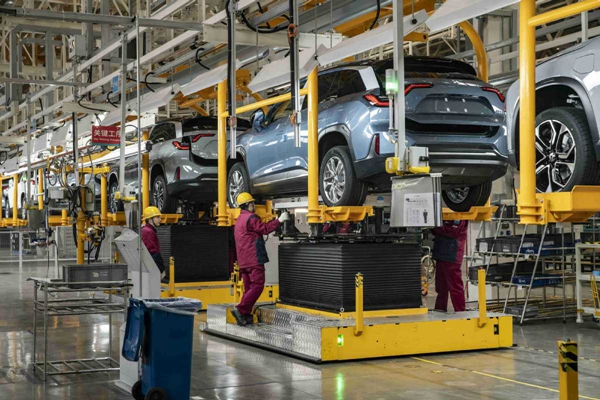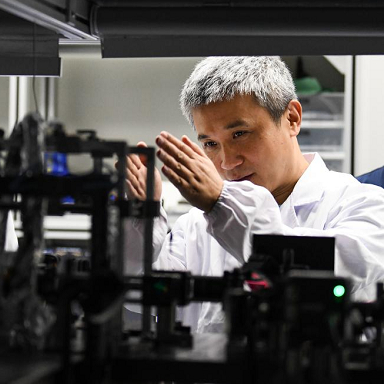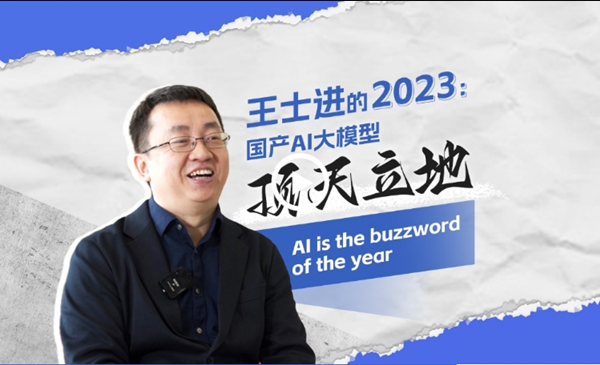Hefei ties 1st place for Q1 GDP growth

Employees install batteries in an electric sport utility vehicle at Nio's factory in Hefei, Anhui province. [Photo/Agencies]
In recent years, Hefei, capital of East China's Anhui province, has been considered by many business insiders as one of the cities with the fastest economic growth in China.
The city announced on May 6 that its gross domestic product rose by 5.3 percent year-on-year in the first quarter to more than 250 billion yuan ($37.2 billion).
Among the 41 cities in the Yangtze River Delta region, centered on Shanghai, eight saw their GDP surpass 1 trillion yuan last year. As one of the region's three sub-centers-the other two being Nanjing and Hangzhou-Hefei won joint first place, with Zhejiang province's coastal city Ningbo, for the Q1 GDP growth rate among the eight cities.
Data from the National Bureau of Statistics showed that the country's value-added industrial output value of enterprises above the designated size-annual revenue of 20 million yuan-rose by 6.5 percent year-on-year in the first quarter.
Meanwhile, Hefei's growth rate at this aspect in the same period was 11.3 percent, the highest among 24 cities across the country whose GDP surpassed 1 trillion yuan last year, according to the Hefei Bureau of Statistics.
Earlier this month, the city contracted 24 projects, with total investment hitting more than 100 billion yuan, through an online event held on May 10.
More than half of the investment will go to the new energy vehicle industry, while others will mainly strengthen such fields as integrated circuits, new-type display screens, biological medicine and new materials, according to the local government.
The new projects include the construction of the second phase of New York-listed carmaker Nio's second manufacturing plant in Hefei, namely, NeoPark Xinqiao Smart Electric Vehicle Industrial Park.
Nio, with its China headquarters based in the city, announced on April 26 that its 200,000th vehicle rolled off the production line at its first plant in Hefei.
On April 29, the carmaker announced its first new smart electric coupe ET5 was produced in NeoPark, of which the construction started squarely one year ago.
The company said recently it will roll out more affordable vehicles in the next two years to "take on foreign carmakers including Tesla and Volkswagen".
Meanwhile, as Xinhua News Agency reported, Volkswagen Group China announced on May 10 that it planned to establish a new digital sales and services company in Hefei.
The new company is expected to complete the group's entire value chain in terms of manufacturing, R&D, testing, sales and marketing, as well as customer services, according to the group.
"Our customers can expect to enjoy the latest Volkswagen Anhui-produced NEV models through this company in the not-so-distant future," said Stephan Wollenstein, CEO of Volkswagen Group China, whose third Volkswagen electric vehicle plant in China is under construction in Hefei.
Designed with an annual production capacity of 300,000 electric vehicles, the plant's construction is scheduled to be completed by mid-2022, with the first NEV model expected to go into mass production in the second half of 2023.
During a recent online conversation with investors, Yu Aihua, Party secretary of Hefei, said, "When we say Hefei will do something, we just do it, as fast and as good as possible."
In 2021, the city also contracted an investment from BYD of 15 billion yuan to build an NEV plant.
"We heard in May of this year that BYD planned to expand its capacity and invited its executives to Hefei for surveys immediately," said Pan Chenghai, an official with the city's bureau of economy and information technology.
"From the start of negotiations to the beginning of construction, it took only 68 days," said Pan, who described the progress as "Hefei speed".
Approved by the central authorities to build one of the country's four comprehensive science centers, Hefei has also been favored for its science and technology strengths.
In a recent report on its website, the British journal The Economist said Hefei "has reinvented itself lately as a tech hub, with thousands of companies opening in a brief interval".
The report took the city's artificial intelligence sector as an example. "In 2021 alone, more than 2,500 firms claiming to develop fundamental AI software programs arranged within the metropolis, up from 370 in 2020," according to the report.






